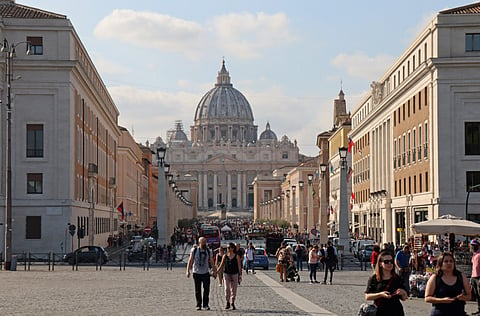Why Rome has ceased to be Rome
The city is in a state of crisis from decades of underfunding — and its decline is playing into the hands of the populist League

Rome. The Eternal City. A place that’s likely on the wish list for many non-Italians to visit. Rome, a city of potholes, uncollected rubbish, and exploding buses. A city where ancient Romans managed to provide enough water to every citizen and slave living there through their system of aqueducts and tunnels, but for whom now the modern-day council struggles to meet those needs.
After years of gradual decline, watching their city fall to pieces around them and seeing a municipal council that’s seemingly unable to change the downward slide, Romans have had enough. And not for the first time in the ancient city’s long history, the Roman citizenry is in the streets.
Last Saturday, in front of Rome’s City Hall, a crowd estimated at up to 8,000 protested the decline and fall of their city.
But the protests too send a signal that the Italian government cannot ignore — that the city, as with most of the heavily indebted nation’s infrastructure, needs more money. And that’s money that Rome and Italy itself does not have.
The national government in Italy is a broad populist coalition made up of the Five Star Movement (FSM) and the League, a right-wing party that grew up in the cities of the industrialised north and is ardently nationalist and determined, as is the phrase so bandied about nowadays, to make Italy great again. That means spending money that Italy doesn’t have, and setting a national budget that so far, the European Union administrators in Brussels say Italy can’t have.
The draft Italian budget for 2019 submitted to Brussels exceeds EU deficit limits, a worrying trend for Eurocrats who view Italy’s debt load with alarm — for every €1 in circulation in Italy another €1.32 is owed to bondholders, banks or international lenders.
So far, Italy’s new government isn’t backing down, and it went so far as to suggest that if Brussels did impose several billions of euros in fines, it would pay them in 10 cent coins — which, while being impractical and likely impossible, does certainly appease supporters of the League for its thumb-on-nose attitude to the European Commission.
But back in Rome, FSM can’t get away with such an attitude, and those protesters who gathered on the streets focused their anger on Mayor Virginia Raggi. She was a star FSM candidate, who was elected in 2016 on a promise to get Rome working as normal again. She’s failed to do that, and the FSM is taking a battering there in support as a result. And the winner locally is the League.
In Rome’s long history, Raggi is the first female mayor. For her part, she says she needs more time, and things are slowly beginning to improve.
Romans, however, are fed up with seeing shared videos on social media of wild boars roaming their streets at night, picking through uncollected rubbish while water supplies were limited during a long, hot summer. Over the past year alone, some 20 city buses have burst into flames, largely because they were poorly maintained by a city bus service that’s starved of funds and unable to keep its fleet properly serviced.
It’s not just the buses that are suffering. Main thoroughfares around the city are rutted and potholed, which is taking a toll too on those buses — and on cars and trucks. To make matters worse, some 20 Moscow football fans were injured last month when an escalator at a Metro station malfunctioned — another embarrassing black eye for a city reeling under the strain of too much to do with so little money.
Lack of money also means that Rome’s police and emergency services are overstretched, and the discovery of a 16-year-old girl’s body in a building used by drug dealers recently has done little to assuage public fears that the city is safe. Police say she was gang raped, and four people have been arrested. That the four held are refugees has increased tensions, playing further to the argument made by the League that the large influx of refugees into Italy has made the nation less safe. Deputy Prime Minister Matteo Salvini has already faced off with Brussels on the issue to turning back boats with refugees rescued from the Mediterranean Sea.
Making matters even more complicated is that Raggi is currently standing trial for alleged abuse of an office over a contested appointment within her administration. That verdict is due on November 10. Lose that, and she said she will resign — which opens the door then for the League to build on its growing popular — and populist — support.
It’s just a good thing that voters won’t have to rely on Rome’s buses to take them to the polls.


